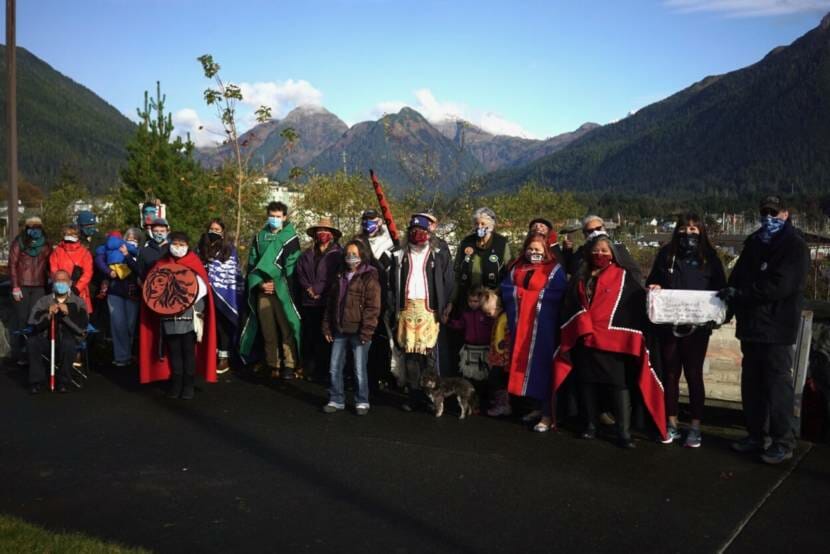
Sunday was Alaska Day, and in any other year, Sitka’s downtown would have been packed with visitors and locals celebrating the town’s biggest event.
This year, the Alaska Day organizing committee canceled the parade and other public events because of the coronavirus pandemic but the growing effort to rebrand the holiday as Reconciliation Day continued.
Castle Hill is where Alaska was formally transferred from Russia to the United States during a ceremony in 1867. A focal point of Sitka’s Alaska Day celebrations is a reenactment of that transfer, but a different sort of ceremony took its place this year.
Before it was known as Castle Hill, it was known to the Tlingit Kiks.ádi clan as Noow Tlein.
Noow Tlein was once the site of Kiks.ádi clan houses, which were later taken by the Russians and destroyed. On Sunday afternoon, a small group of Sitkans gathered there to acknowledge that history.
Dionne Brady-Howard is a teacher at Mt. Edgecumbe High School and was one of the organizers.
“You know there are a lot of really difficult and negative things that have come from social distancing and COVID-19 risk, but one of the things that came from it that could have a more positive spin was that Noow Tlein was available,” Brady-Howard said.
For many members of Sitka’s Native community, Alaska Day isn’t a day of celebration. It’s a day of mourning. The holiday commemorates the sale of stolen land from one colonial power to another. Since 2017, a growing group of Sitkans has held a mourning ceremony at the bottom of the hill while the transfer ceremony takes place at the top. Around 100 people attended the mourning ceremony last year to acknowledge the loss of Tlingit land and grieve lives lost to colonization.
This year, Brady-Howard said the mood was different.
“Because we were at the top where we really belong, rather than having the mourning song or sorrowing song, we actually had songs of celebration,” she said. “And so it was a slightly different incarnation than it has been the last few years.”
Matthew Jackson was one of around 25 masked attendees at Sunday’s event. He said he attended because he feels it’s important that non-Native people like him publicly acknowledge the past injustices and trauma caused by colonization.
“I think settlers acknowledging that and owning up to it is a really important step toward healing some of those divisions in our state. Healing some of those wounds that have been caused by colonization of Alaska,” Jackson said.
That’s the idea behind the name Reconciliation Day, said Louise Brady of the Kiks.ádi clan. Brady was an organizer of Sunday’s ceremony.
“So our way of life was systematically taken apart,” Brady said. “So I think it’s time that the truth is told because I think if we don’t acknowledge the truth, we can’t get to that place where we can acknowledge it and we can start healing.”
Brady said she hopes that moving forward, there can be more dialogue between her group and the organizers of the Alaska Day celebrations.
